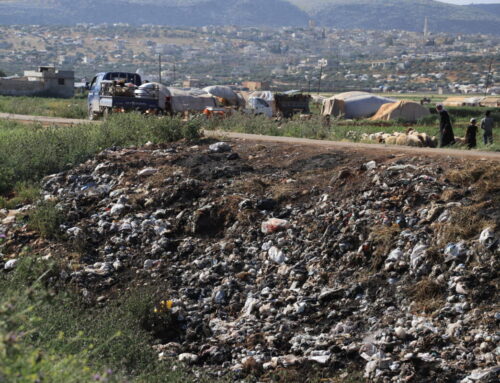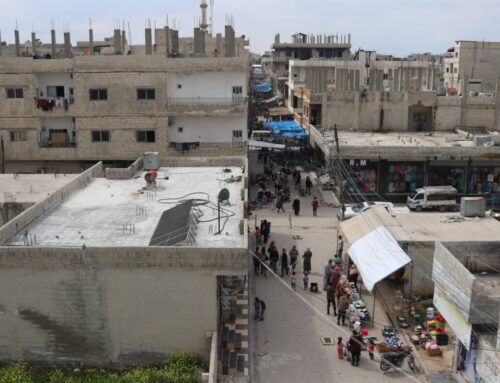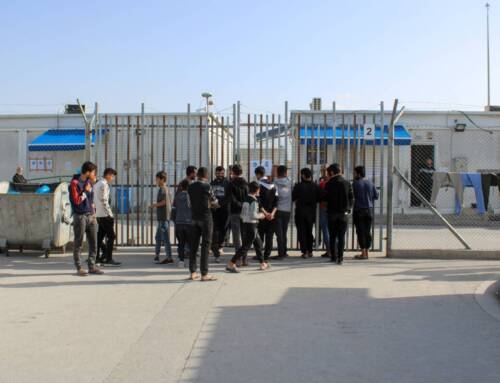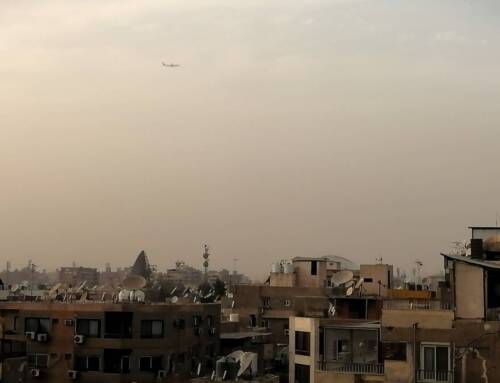Latest amnesty decree ‘empty talk’ for Syrian army defectors living in displacement
Syria’s commander-in-chief and defence minister in Aleppo in 2016. Photo […]
18 October 2018

AMMAN: Abu Abdallah had more than 20 years of military experience behind him when he made the risky decision to desert his post.
“When the killing of protesters began,” he says, “I made a 180-degree turn.”
Abu Abdullah says he was left with a choice: “whether [to] betray humanity or [to] betray Bashar al-Assad.”
“[In that case], I would rather betray Bashar al-Assad.”
Abu Abdullah, who requested a pseudonym for security reasons, is one of countless Syrian men, young and old, who’ve fled the country since 2011 to either desert the army or avoid a longstanding system of military conscription that is mandatory for all men aged between 18 and 42.
Since Abu Abdallah defected in 2013, taking a perilous journey through the deserts separating Syria and Jordan, half of Syria’s population has been displaced outside its borders while the Syrian government has reasserted control over the majority of the country for the first time in years.
However, last week, the Syrian government issued an amnesty for all deserters and draft dodgers. Quickly disregarded by analysts and displaced Syrians as simply a repeat of past decrees, the timing and content of the announcement could point to how the Syrian government intends not only to encourage millions of displaced Syrians to return home, but also bolster its post-war reconstruction efforts in the process.
And while government officials suggest this decree could be the last chance for both deserters and draft dodgers to ever return and receive pardon from a Syrian government in resurgence, officers who deserted say they’re staying put, calling the amnesty a fraud.
‘Empty talk’
Through Decree No. 18, passed on October 9, the Syrian government purportedly lays out a timeline for deserters and draft dodgers—both inside and outside Syria—to safely return without facing prosecution for violating laws related to military service. Under the conditions of the amnesty, deserters and draft dodgers currently outside the country have six months to return, whereas those inside have just four.
But under closer scrutiny, the amnesty has limitations.
While the pardon applies to people who have deserted the army or fled the country to avoid military service, it does not include defectors—Syrians who left the army to join opposition factions, and who were subsequently regarded as “terrorists” in the eyes of the government.
When Abu Yassin decided to desert the army in 2012, he originally wanted to join the armed opposition. But the road north out of Damascus, dotted with row after row of checkpoints manned by Syrian soldiers and security forces, ultimately put him off. The risks were simply too great. He ultimately left for Jordan in 2013. Abu Yassin requested a pseudonym for fear of political reprisals.
Embed from Getty Images
A view of Amman in June. Photo courtesy of Martyn Aim/Corbis via Getty Images.
Before deserting, his 30 years of service in the military had granted Abu Yassin a special social standing. He was respected by his community, and well-connected.
But when he deserted his post and left for Jordan, most ties to friends and relatives inside Syria were immediately cut—his loved ones feared for their own safety, and the risk that they’d be tarred with guilt by association, he says.
Abu Yassin is skeptical about this month’s decree. Knowing the military well from the inside, he says, he sees the government’s promises of an amnesty as nothing more than a “trap and a lie, in order to lure us back [to Syria].”
Muhammad Ibrahim Turkawi, a 23-year-old deserter currently in Idlib, fled his own rank in the army in 2015 and headed north. He says he’s unwilling to ever return back to life under government control.
“The decree is empty talk,” Turkawi tells Syria Direct from Atma, a poorly equipped displacement camp in Idlib province sitting directly on the Syrian-Turkish border.
“It wouldn’t matter even if there were a hundred amnesties issued.”
‘A useful box-ticking exercise’
This is not the first time the Syrian government has offered a way out for those who either deserted the army or fled the looming prospect of military conscription since the outbreak of the 2011 uprising and ensuing conflict.
The amnesty issued last week shares many of the same details as others announced in 2015 and in 2016—although the 2016 decree only gave deserters one month to turn themselves in if they were still inside the country, and two months if they were abroad.
“I don’t think it’s a game changer,” says one political and security risk analyst at a US-based think tank, who requested anonymity for security reasons. “[Still], the timing is very interesting.”
Over the past year, the Syrian government has regained control over the majority of the country. Idlib remains the last major rebel stronghold in the country, though the chances of avoiding an all-out pro-government offensive there currently hinge on the proper implementation of a shaky ceasefire agreement brokered by Russian President Vladmir Putin and Turkish President Recep Tayyip Erdogan last month.
Throughout the sweeping military offensives and reconciliation agreements that have brought much of Syria back under government control, officials have been keen to present the country as one undergoing a resurgence. In an attempt to promote the narrative that Syria is fast approaching a period of post-war reconstruction, the government has called on several million Syrian refugees scattered across neighbouring countries and beyond to return home and help rebuild the country.
“The doors are wide open for all Syrians abroad to return voluntarily and safely,” said Foreign Minister Walid al-Muallem in a speech at the UN’s General Assembly last month, describing a country that is now “safer and more stable.”
According to the US-based analyst, the decree provides a “good selling point” in the Syrian government’s pursuit of international legitimacy and donor money for directing towards the reconstruction of a country devastated by seven long years of war.
“It’s a useful box-ticking exercise,” he says, one geared towards a larger shift in the discourse around displacement and the Syrian conflict—and one that could be put to expedient use by countries hosting large numbers of Syrian refugees in order to encourage returns.
Over the past year, Lebanon has significantly increased the pressure on Syrian refugees to return home, opening registration centers and working alongside Syrian institutions to facilitate returns back across the border. The UN’s refugee agency, UNHCR, however, maintains that the political and humanitarian conditions in Syria still mean it’s well premature to be talking about returns.
A return home?
A large share of young men who left Syria over the course of the war did so in order to escape the mandatory military service, and fears of conscription remain a significant deterrent keeping refugees from returning.
Still, some draft dodgers may be encouraged to return, the anonymous analyst says, though some escapees might be inclined to take this opportunity to go home.
“A lot of Syrians outside of the country are not necessarily against the government, but [left] because they didn’t want to serve in the military,” the analyst says.
At the same time, deteriorating living conditions for Syrian refugee communities in neighboring countries have already pushed some to take the decision to return home.
Before Abu Abdallah and his family fled Syria, he says he had a “comfortable” life—a car, an office and even personal bodyguards.
But times have changed. Now, he depends on his children to support him financially.
Still, having registered with UNHCR and living a semblance of normalcy in Jordan, he refuses to even consider returning to the country he served as a military officer for more than two decades.
Abu Abdallah remains convinced he will not return home—not now, not ever.
“Whatever the guarantees were,” he says, “I’ll never go back to Syria.”







